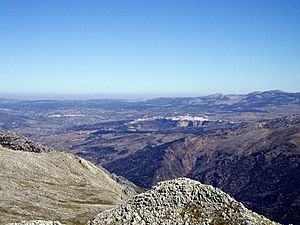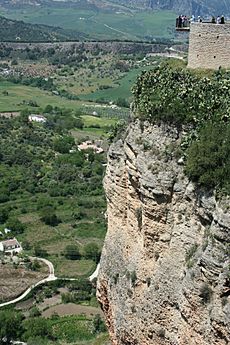Ronda Depression facts for kids
The Ronda Depression is a special flat area of land in Andalusia, Spain. It's like a big, flat tableland or plateau surrounded by mountains. This area is also known as Hoya de Ronda or Vega de Ronda. It's part of a chain of valleys found in the Cordillera Penibética mountain range.
This flat area sits high up, between 700 and 1000 meters (about 2,300 to 3,300 feet) above sea level. It's mostly made of sedimentary materials like sandstone (rock made from sand), clay (fine dirt), and conglomerates (rocks made of different pebbles stuck together). The Ronda Depression is surrounded by the mountains of the Serranía de Ronda. It connects to other valleys: the Guadalteba valley to the north, the Guadiaro valley to the southwest, and the Genal valley to the southeast. Even though it's mostly flat, it has deep cuts or canyons, which locals call "tajos" (meaning "pits").
Rivers of the Ronda Depression
The main rivers flowing through this area are the Guadalevín and the Guadalcobacín. When these two rivers meet, they form the Guadiaro River.
Climate
The weather in the Ronda Depression is mostly Mediterranean, which means it has hot, dry summers and mild, wet winters. However, it also has a strong mix of Continental weather, which means the winters can be quite cold and the summers very hot.
Plants and Trees
The most common trees you'll find here are Oaks and Cork Oaks. In places where it's wetter, you might also see some Portuguese Oak trees. Along the riverbanks, there are special riparian forests, which are forests that grow near water. These forests have trees like elms, cottonwoods, poplars, and willows.
Over time, people have changed the landscape quite a bit. They've cleared some of the forests to create farmland, olive orchards, and areas for animals to graze. There are also towns and cities built here. When livestock (like cows or sheep) graze too much, it can damage the oak forests, turning them into scrubland with plants like thyme, rosemary, and esparto grass.
See also
 In Spanish: Depresión de Ronda para niños
In Spanish: Depresión de Ronda para niños
 | Dorothy Vaughan |
 | Charles Henry Turner |
 | Hildrus Poindexter |
 | Henry Cecil McBay |



